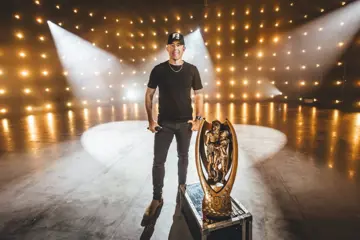Just weeks after Amazon Music revealed that it would sponsor the National Indigenous Music Awards (NIMAs) in a multi-year deal, the star-studded performers for this year’s spectacular event have been unveiled.
On Saturday, 12 August, the NIMAs will celebrate First Nations talents, with the award ceremony taking place at the iconic Darwin Amphitheatre on Larrakia Country.
Tickets to attend the event are officially on sale via the Darwin Festival website, and with a line-up featuring world-class acts Thelma Plum, Budjerah, Barkaa, Kobie Dee, Dean Brady and Ngulmiya, you won’t want to miss out.
In addition to the electrifying NIMAs, Blak Out will host a wrap-up of the Awards simulcast across triple j, Double J and triple j Unearthed from 5 pm on Sunday, 13 August. Nooky will bring the live performances, the highlights from the ceremony, artist chats and all the night’s winners.
“I'm geed to celebrate another big year for Indigenous artists and can’t wait to share the NIMAs with you mob on triple j’s Blak Out, and I can’t wait to get around the action in person this year and watch the mob rip it up,” Nooky said about this year’s partnership.
Don't miss a beat with our FREE daily newsletter
Be sure to keep your eyes peeled for triple j Unearthed’s NIMAs triple j Unearthed Competition. Last year’s winner Bumpy brought the house down with her booming vocals and soulful melodies.
Revelling in her excitement to perform at the NIMAs for a third time, Plum said in a statement, “This will be third time lucky for me to play the NIMAs I can’t wait to finally play that beautiful Amphitheatre on Larrakia Country!”
In 2012 Plum broke out as a teen folk singer with the single Father Said, which she'd uploaded onto triple j's Unearthed platform. By 2019, she arrived with Better In Blak.
The musician revealed an adroitness at reformulating, and individualising, modish pop paradigms to explore both personal and social themes relating to her First Nations identity, The Music’s cover story stated.
Better In Blak traversed heartland rock, retro-soul and gleaming electro. It was critically acclaimed – and Plum received nominations for multiple ARIAs (including Album of the Year) and the Australian Music Prize. Last year, Plum released the equally stunning Meanjin.
Meanwhile, Dean Brady has been climbing up the NIMA radio charts, with his song Falling at #9 last week. He will perform alongside the iconic ceremony leader and songman from Arnhem Land with a godlike voice, Ngulmiya.
Last year’s NIMAs Film Clip Of The Year award winner, Barkaa, for her banging track King Brown, will stun attendees on stage. However, she isn’t the only rapper hitting the stage, with Kobie Dee also on the bill. A performer praised by Briggs as "a rapper’s rapper", this Gomeroi artist has an innate gift for storytelling and connecting with his audience.
And Budjerah, fresh off his opening slot for Ed Sheeran in stadiums across the country, Vivid LIVE performance, his Best New Artist win at the Rolling Stone Awards and hanging out with Prime Minister Anthony Albanese on Record Store Day, is a shining star.
Budjerah grew up in Fingal Heads, a coastal town in New South Wales, and is part of the first generation in a long time to have traditional names in his family.
He speaks Bandjalang, the native language of the Coodjingburra people, and that impact isn't lost on Budjerah. "It's very special. My family... We're very lucky we didn't get moved on from our land. We're very lucky that we were able to sneak dances and our language," he shared with The Music, especially when his grandparents and great-grandparents were growing up, they weren't allowed to go over the river into town.
Budjerah added, "A lot of Aboriginal communities don't get what I got. It's just how I live; I'm very used to it. My generation is the first generation to have traditional names like Budjerah again. We had to keep it a secret - my pop doesn't speak [Bandjalang]. My dad's generation, and then my generation, we got it back."















